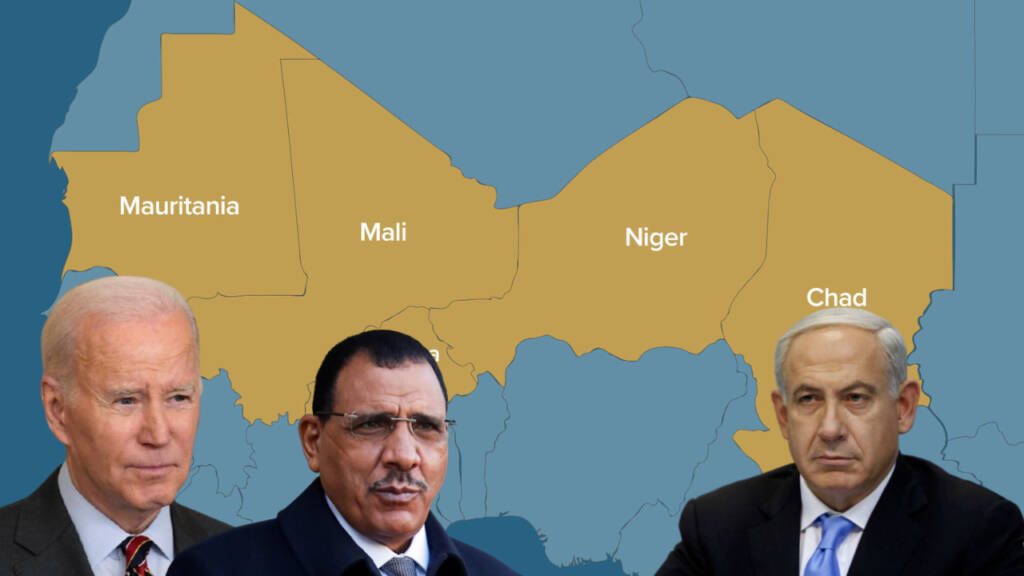US-Niger-Israel ties: There was a time when Niger’s President, Mohamed Bazoum, made some comments that must have shocked the West. On July 9, 2021, Bazoum stated in an interview with the French daily La Croix that Mali’s isolation was undermining the fight against terrorism and that Mali’s withdrawal from the G5 Sahel would mark the end of the alliance. He also said that the G5 had failed in its purpose of wiping out terrorism from the region.
Coming from a country that was believed to be on the side of the West, Bazoum’s comments almost hinted that he was going anti-West, as such sentiments were already on the rise in the Sahel region. There were large-scale protests against the French troops stationed in the country, and France has already withdrawn its troops from Mali and more recently Burkina Faso. However, since then, the US has been trying hard to please Niger and stop it from slipping out of its sphere of influence. Now, it looks like it has almost succeeded and is eyeing to get Niger on board to join hands (US-Niger-Israel ties) with Israel to strengthen its position and geopolitical relevance in the Sahel region.
US-Niger-Israel ties : US eyes Niger
According to a recent report, the US is pressuring Niger to normalize relations with Israel. During his trip to Africa in March, US Secretary of State Antony Blinken urged Niger’s President Mohamed Bazoum to move toward normalizing relations with Israel, according to Axios. The two countries officially severed ties in 2002 over Israeli military action in the Palestinian territories. Multiple unnamed Israeli officials said that Niger’s leadership is open to warming ties with Israel, but they hope for deliverables in return from Washington. Blinken also briefed Israeli Foreign Minister Eli Cohen on the discussions and proposed inviting Niger to the next Negev Forum, an annual event involving the US, Israel, and Arab states such as Bahrain, Egypt, the United Arab Emirates, and Morocco.
Blinken’s trip to Niger made him the first US Secretary of State to visit the West African country, which is emerging as a key US security partner in the Sahel, a region swept by anti-West sentiments of late. The US has invested heavily in Niger’s strategic and military interests. Washington invested $110 million to construct a massive drone base in the country in 2016 and has continued to provide large sums of security and humanitarian aid. US troops have operated in Niger intermittently throughout the War on Terror and were deployed there under a broad ‘status of forces’ deal in 2013.
During his visit, Blinken announced a $150 million aid package for Sahel nations, including Niger, Chad, Mali, Mauritania, and Burkina Faso, bringing total US assistance to the region to $233 million in 2023. All of these efforts highlight the importance of the US staying relevant in the Sahel region and reversing the trend of growing anti-West sentiments in the strategically important area. By securing its interests in Niger and potentially forming a US-Niger-Israel ties , the US could have significant geopolitical implications for the Sahel region.
Read More: France’s nuclear attack on Niger
US-Israel-Niger ties vs Algeria-Iran axis in Sahel?
We previously explained that the EU and the US are increasingly concerned about the close relationship between Algeria, Iran, and Russia. There are reports suggesting that the Algerian regime is receiving drones from Iran, which are being supplied directly to the armed militias of the Polisario front.
Moreover, Iran is likely to be promoting the most radical branch of Islam in the Sahel and Sahara, with the support of the Algerian military system. If the Iran-Algeria partnership succeeds, it could have significant implications for the Sahel region, which is considered the gateway to the wider continent. This is a major concern for the West.
Read More: Algeria’s unlikely ally: how will their partnership shape the future of the Sahel
In recent years, Israel has normalized relations with several Arab or Muslim-majority states under the US-brokered Abraham Accords, including Sudan and Morocco. Israel has also strengthened its ties with Chad in Africa, seeking a greater presence in the continent.
Given this context, it is possible that the US, by pressuring Niger to normalize relations with Israel, may try to counter the Algeria-Iran threat in the Sahel region more effectively. This move would provide the US with greater opportunities to solidify its geopolitical presence in the Sahel. Israel and Niger had cut ties in 1973, and contacts were again cut in 2002 after renewed Israeli fighting with the Palestinians. However, in the wake of the 1996 Oslo Accords, ties had warmed between the two countries.
Additionally, countries like Morocco, Israel, and the US are also signatories to the Abraham Accords, and they all face a shared threat from Iran. In the case of Morocco, the threat is more indirect, as the Iranians from Algeria are involved in promoting the Polisario Front and working against Moroccan interests. It is possible that the Biden administration is working behind the scenes to include more Arab and Muslim-majority countries in the Abraham Accords.
Read More: Iran, Russia, Israel, UAE, US and the anti-government Polisario movement
Thus, if the US succeeds and Niger and Israel indeed normalize ties, it will likely enhance the US’ stature in the Sahel region in the face of the Algeria-Iran threat. It will also be an opportunity for Israel to expand its footprint in the Sahel. However, how the situation will unfold in the near future remains to be seen, but it is clear that it could create a major geopolitical upheaval in the Sahel region.
https://www.youtube.com/watch?v=DHDKJotfUvo
